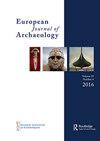在奥斯曼帝国、土耳其和希腊发展考古学和博物馆学:thamesodore Macridy,一位奥斯曼希腊的“极限科学家”
IF 1.4
2区 历史学
0 ARCHAEOLOGY
引用次数: 0
摘要
本文通过Théodore Macridy的生活和职业生涯,关注奥斯曼帝国、土耳其和希腊考古和博物馆学的发展。麦克里迪参与了不止一个学科和不止一个国家的知识转移。通过他与西方考古学和博物馆学界的联系,他为他们在奥斯曼帝国、土耳其和希腊的发展做出了重大贡献。作为一名希腊裔奥斯曼公民,他生活在奥斯曼和希腊知识界之间,挖掘了奥斯曼帝国的许多遗址,在奥斯曼帝国博物馆工作,并在其职业生涯结束时为雅典贝纳基博物馆的建立做出了贡献。这使他成为奥斯曼希腊学者的一个很好的例子,他的边缘身份导致他在希腊和土耳其考古和博物馆学中相对被忽视。本文章由计算机程序翻译,如有差异,请以英文原文为准。
Developing Archaeology and Museology in the Ottoman Empire, Turkey, and Greece: Théodore Macridy, an Ottoman Greek ‘Liminal Scientist’
This article concerns the development of archaeology and museology, in the Ottoman Empire, Turkey, and Greece, through the life and career of Théodore Macridy. Macridy participated in knowledge transfer in more than one discipline and more than one country. Through his links with Western academic circles in archaeology and museology, he made a significant contribution to their development in the Ottoman Empire, Turkey, and Greece. Living between the Ottoman and Greek epistemic communities as an Ottoman citizen of Greek origin, he excavated numerous sites of the Ottoman Empire, worked at the Ottoman Imperial Museum, and contributed to the foundation of the Benaki Museum in Athens at the end of his career. This makes him a good example of an Ottoman Greek scholar whose liminal identity led to his relative neglect in both Greek and Turkish archaeology and museology.
求助全文
通过发布文献求助,成功后即可免费获取论文全文。
去求助
来源期刊

European Journal of Archaeology
ARCHAEOLOGY-
CiteScore
3.40
自引率
6.70%
发文量
58
期刊介绍:
The publication organ of the European Association of Archaeologists, the European Journal of Archaeology seeks to promote open debate amongst archaeologists committed to a new idea of Europe in which there is more communication across national frontiers and more interest in interpretation. The journal accepts not only new empirical data and new interpretations of the past but also encourages debate about the role archaeology plays in society, how it should be organized in a changing Europe, and the ethics of archaeological practice. All periods are covered; papers, review articles, interviews and short "debate" pieces are all sought. Whilst English is the primary language of publication in the EJA, papers submitted in French or German will be given equal consideration.
 求助内容:
求助内容: 应助结果提醒方式:
应助结果提醒方式:


